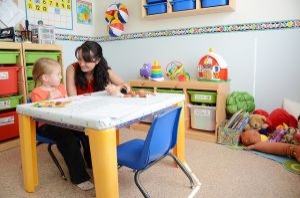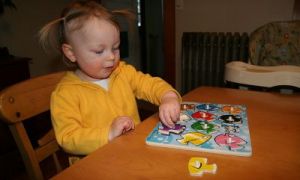The differences between a Certificate III and a Diploma in Early Childhood Education and Care depends on your career goals, current qualifications, and the level of responsibility you wish to take on. The following article provides information on the Cert 3 and Diploma in Early Childhood Education and Care.
Certificate III in Early Childhood Education and Care
The Certificate III in Early Childhood Education and Care is designed to provide foundational knowledge and skills for those looking to work in early childhood education settings. This is the entry level qualification for anyone who wants to work in early childhood education and care.
-
Duration: Typically 12 to 24 months.
-
Entry Requirements: Generally, no prior qualifications are required.
-
Focus: Provides foundational knowledge and skills for working with children.
-
Career Opportunities: Prepares you for roles such as Childhood Educator Assistant, Outside School Hours Care Aide, Preschool Assistant, and Nanny.
-
Responsibilities: Focuses on supporting the implementation of an approved learning framework, and assisting in the planning and delivery of educational programs.
-
Pathways: Can lead to further study, such as a Diploma of Early Childhood Education and Care.
What You Will Learn
-
Child Development: Understanding the developmental stages of children from birth to 5 years old.
-
Health and Safety: Implementing health, safety, and wellbeing practices.
-
Educational Frameworks: Applying the Early Years Learning Framework (EYLF) and other approved learning frameworks.
-
Practical Skills: Providing care, creating educational activities, and supporting children's learning and development.
-
Communication: Developing positive and respectful relationships with children, families, and colleagues.
Benefits of the Course
-
Earn While You Learn: Traineeships are paid positions, allowing you to earn an income while gaining valuable skills and qualifications.
-
Hands-On Experience: Gain practical experience in a real-world setting, applying what you learn in your coursework.
-
Mentorship: Receive guidance and support from experienced educators.
-
Nationally Recognized Qualification: Upon completion, you will receive a nationally recognized qualification that can enhance your career prospects.
Diploma of Early Childhood Education and Care
The Diploma of Early Childhood Education and Care is designed for those who want to take on more advanced roles in early childhood education.
-
Duration: Typically 18 to 24 months.
-
Entry Requirements: Often requires completion of Certificate III or relevant experience.
-
Focus: Provides advanced knowledge and skills, including leadership and management.
-
Career Opportunities: Prepares you for roles such as Early Childhood Educator, Room Leader, Educational Leader, Centre Director, and Family Day Care Coordinator.
-
Responsibilities: Involves designing, implementing, and evaluating educational programs, and leading and managing staff.
-
Pathways: Can lead to further study, such as a Bachelor of Early Childhood Education, and more advanced career opportunities.
What You Will Learn
-
Advanced Child Development: Deepen your understanding of the developmental stages of children from birth to 5 years old.
-
Health and Safety: Implement advanced health, safety, and wellbeing practices.
-
Curriculum Development: Design, implement, and evaluate educational programs that align with the Early Years Learning Framework (EYLF) and other approved learning frameworks.
-
Leadership Skills: Develop leadership and management skills to supervise staff and volunteers.
-
Family and Community Engagement: Learn strategies to effectively engage with families and the community to support children's learning and development.
Benefits of the Course
-
Earn While You Learn: Traineeships are paid positions, allowing you to earn an income while gaining valuable skills and qualifications.
-
Hands-On Experience: Gain practical experience in a real-world setting, applying what you learn in your coursework.
-
Mentorship: Receive guidance and support from experienced educators.
-
Nationally Recognized Qualification: Upon completion, you will receive a nationally recognized qualification that can enhance your career prospects.
Key Differences
-
Level of Responsibility: The Diploma prepares you for higher-level roles with more responsibility, including leadership and management positions.
-
Depth of Knowledge: The Diploma offers more in-depth knowledge and skills compared to the Certificate III.
-
Career Advancement: The Diploma provides more opportunities for career advancement and higher-level positions within the early childhood education sector.
Considerations
-
Career Goals: If you aim to take on leadership roles and have more responsibility, the Diploma is a better choice. If you are starting your career and want to gain foundational skills, the Certificate III is a good starting point.
-
Time and Commitment: Consider the time and commitment required for each qualification. The Diploma typically takes longer to complete and may require more intensive study.
By understanding these differences, you can make an informed decision about which qualification best suits your career aspirations and current situation.
Further Reading
Cert 3 Qualified Educator Wages In Early Childhood Services
Diploma Qualified Educator Wages In Early Childhood
Childcare Wages In Australia
Childcare Traineeship Wages and Conditions
References:
CHC50121 Diploma of Early Childhood Education and Care, ACCCO
CHC30121 Certificate III in Early Childhood Education and Care, ACCO







 Whether you are doing a Cert 3 or a Diploma traineeship or thinking about doing a traineeship it’s a good idea to understand what wages
Whether you are doing a Cert 3 or a Diploma traineeship or thinking about doing a traineeship it’s a good idea to understand what wages Work placement is an excellent opportunity for you to prepare and gain insight into the early childhood industry as well as help you to clarify
Work placement is an excellent opportunity for you to prepare and gain insight into the early childhood industry as well as help you to clarify Are you thinking of starting a traineeship in childcare? Well from personal experience, working in this child care industry brings great fulfilment and satisfaction. Watching
Are you thinking of starting a traineeship in childcare? Well from personal experience, working in this child care industry brings great fulfilment and satisfaction. Watching There is no truth to the rumour that the certificate III or 'actively working towards' will be phased out.
There is no truth to the rumour that the certificate III or 'actively working towards' will be phased out.
 For educators looking to update their qualification and have the required knowledge, experience and skills instead of completing assignments and tasks to complete a qualification
For educators looking to update their qualification and have the required knowledge, experience and skills instead of completing assignments and tasks to complete a qualification As a student finding information and doing research is an important part of completing assignments. Once you find the information you need to complete the
As a student finding information and doing research is an important part of completing assignments. Once you find the information you need to complete the Being a student and completing assessments can be a hard task. Especially when you don’t understand what the question is, you have to write an
Being a student and completing assessments can be a hard task. Especially when you don’t understand what the question is, you have to write an As you take the next big step and decide to continue studying you need to decide whether you will be able to manage working at
As you take the next big step and decide to continue studying you need to decide whether you will be able to manage working at Hiring overseas educators can not only bring a service the benefits of a diverse, multicultural workplace but also address staffing shortage issues. However before an
Hiring overseas educators can not only bring a service the benefits of a diverse, multicultural workplace but also address staffing shortage issues. However before an Making the decision to study is a big one. It can be stressful, thinking of how you're going to complete assignments or if you're going
Making the decision to study is a big one. It can be stressful, thinking of how you're going to complete assignments or if you're going


